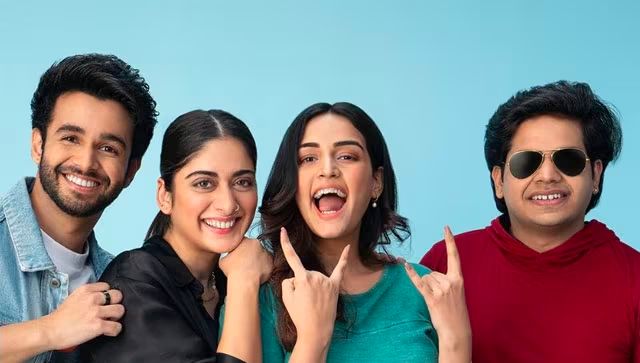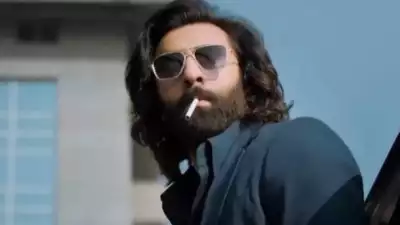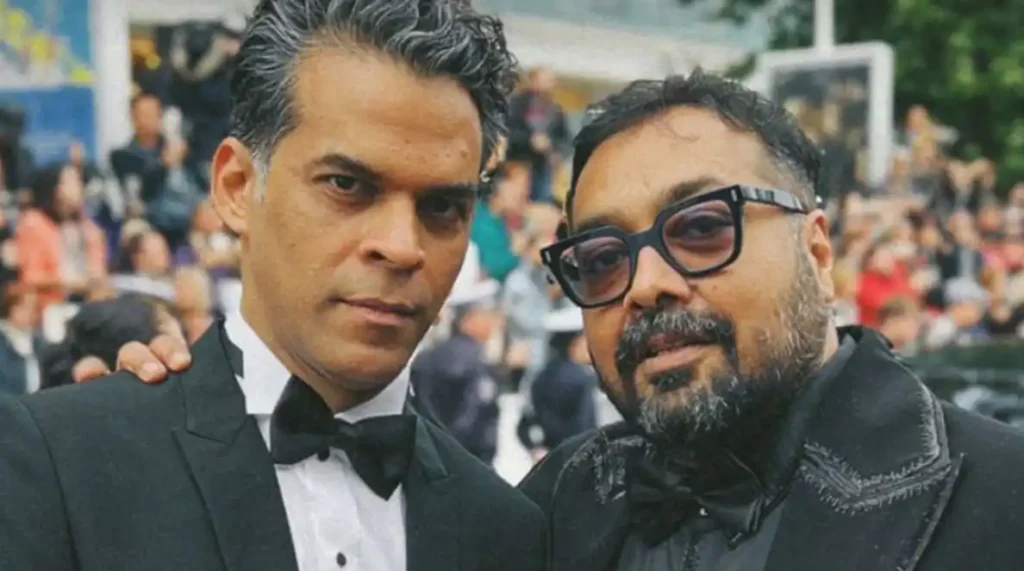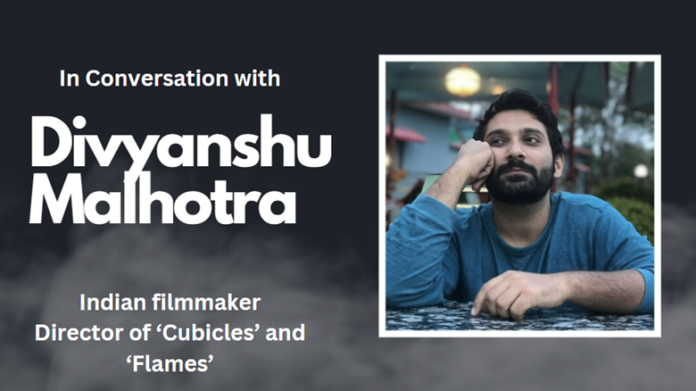Edited by – Robin Bhuyan (Editor-in-Chief)
Interviewed by – Robin Tyagi
Written by – Geetashree Roy
Divyanshu Malhotra is a writer and director who is known for directing two popular web series Flames¸ an Amazon Prime original show and Cubicles, a SonyLiv original. He has showcased his talent in muliple other popular shows such as Bandish Bandits, where he was a lyricist.
Previously, he used to work in the media industry, and during this time, he developed a his skills in various fields such as directing, acting, art, creative direction, photography, advertising, writing, and film production.
In this exclusive interview, he shares his journey as a director, as well as shares some of his insights regarding cinema.
How did you come into the entertainment industry from the engineering sector?
Honestly, none of these happened suddenly. For me, pursuing engineering was like a deal with my parents so that I would be able to fulfill my dreams. It was like if I would fulfill their dream, which was to see me as an engineer, they would let me achieve mine. During my school time, when I was growing up, after a certain period, I developed the hobby of reading and writing. I belong to a middle-class Punjabi family where my sisters were older than me. During my school years, my sisters were in college, and my parents were busy in their banking jobs. So, I used to get a lot of self-time, and probably from class 6th or 7th, I spent a lot of time with myself only. At that time, writing was a valid source for me to express my feelings. But, I learned structured writing through poetry, plays, and theatre. Through my theatre journey, I got to know about speech, text, and tone. Previously, I used to write in my diary, but later, I posted and recorded them on social media. This is how my interest shifted to writing, theatre, and direction.

How did you come into direction?
To be honest, I came into direction as I sensed that there is a lack of good directors around me. I was exposed only to theatre during my upbringing. So, I got attached to films and web series only after a long time. From childhood, my dream was to start my career in theatre. While acting in theatre, I had many visions of creating scenes in different ways. I learned to manage the entire crew, which was the first step in my direction journey. For my management skills specifically, I got the opportunity to direct. This opportunity gradually turned into my passion and hobby. I enjoyed direction very much as I got the chance to create everything from scratch. There are a lot of things to plan in the direction, like how the world will be, what colors to use, how the characters will be, etc. Besides being able to showcase my creativity, direction gave me financial support as well. Acting has some risk factors, as in my time, there were no OTT platforms. So, for me, direction was quite a safe way to enter the film industry. Also, it brought me a lot of opportunities like ad direction, corporate film direction, wedding film direction etc. However, presently, I am trying to drag myself into acting again after almost 10 years, as I think I have the sensibility now.
Is there any film director who has influenced you?
Actually, many directors have influenced me. To be specific, I like those directors for some of their particular qualities. For instance, I love Vishal Bharadwaj for his text adaptation skills and how he has brought works of Shakespeare to the screenplay. I also like Zoya Akhtar’s work as she perfectly represents the core human values even in upper class families who live a luxurious life. Anurag Kashyap shows madness is important to fulfill your dreams. You need a strong willpower to reach the goal. Vikramaditya Motwane teaches us, irrespective of being a signature director, how you can visualize in a versatile way. He has directed versatile movies like Lootera and Bhabesh Joshi. So, I got inspired by several directors for their different directions, skills, and visions.
What do you feel about director Sandeep Reddy Vanga, and have you learnt anything from him?
To be very honest, I don’t have any opinion of him as I haven’t watched his films yet. I haven’t watched those movies yet because there are a lot of controversies revolving around them. I usually stay disconnected from controversial things till the noise is settled so that I can make an unfiltered and unbiased opinion of my own. So, I think I will watch those movies when I can watch them from an unfiltered and neutral point of view. To be specific, I am not very comfortable around the typical “Alpha Male” characters. If you see the male characters in my works, they do not resemble the typical “alpha male” character at all. In my life, I have seen the disadvantages of being a such an alpha male personality in people around me. As I am a soft-hearted person, I may not understand the concept of having an “alpha male” personality. Even in my poem Inquilab, I have written about rebels but through writing. For me, a pen can be the best weapon to bring a revolution.

So, do you belong to the group opposing the Animal movie?
Well, I can answer this question after a certain period when I will watch the movie from a neutral viewpoint.
Which project was your most satisfactory work and why?
For me, satisfaction comes when I have enough grip over a particular project. In the beginning, we have to prove to people who we are and how we work. After doing some tasks, people understand our workstyle, and appreciate our crafts properly. For me, my recent works were very satisfactory because I was able to put my crafts properly in those projects. Besides, my entire crew trusted me completely so that I could put my best efforts into the projects. So, Flames and Cubicles have been very satisfactory projects for me.
Being an director from an engineering background, what do you think about AI’s influence on the film industry?
It’s an inevitable truth that artificial intelligence will impact the industry. Already, many agencies are using AI due to its versatility. So, it would be wrong if I say that there is no threat from AI. Until there are rules and regulations on the usage of artificial intelligence, it will surely impact all of us. I must say that AI can generate 30 pages in a few seconds, but it can’t beat your 30 years of experience. That is completely your gained experience and your skills. I also tried ChatGpt to form a story. Being an engineer, I wanted to know how advanced it is, and my writer personality wanted to know how much threat there actually is. After the conclusion, I saw that technique-wise, AI was perfect, but the perspective was not satisfactory at all as AI has no human vision and thought process. So, AI will help you to some extent, but there is no huge threat to it as it can’t snatch your skills.
How have OTT platforms impacted the industry? Is a censor board necessary here?
OTT has a great impact on the TV and film industry. Even younger directors like me got several opportunities for the OTT platforms because otherwise we would be working as assistant directors on film sets. Families became more connected during the Covid times due to these OTT platforms. So, these are the positive impacts of OTT. Now, if we come to the negative effects, there comes the requirement of a censor board. As a director, I want to direct stories that everyone can watch together. So, there must be general hygiene in every content and censor board is necessary to maintain this hygiene. Until the censor board limits itself to maintaining hygiene, it is required for the OTT platforms as well. However, it is important that a censor board doesn’t get political and tell us what kind of story we can or cannot show. So, before we say whether a censor board is necessary or not, it is important to define the role of the censor board.

What challenges have you faced while collaborating with the entire crew?
The main challenge is to make the cast and crew able to walk on your vision. In my direction journey, I also learned that every single thing is not my responsibility. I am here to direct a story and represent my visualization. So, it’s important to get the best people in your team and instruct them in the right way so that they can carry out the work that is needed to reflect your visualization. For the systematic working process, I really faced fewer challenges to collaborate with my crew. When every single member understands everyone’s responsibility, the work becomes easier.
Is there any director or producer you want to work with in the near future?
I want to work with Vikramaditya Motwane, in a project where he will be a producer, and I will be the director. I like his visions and approach towards things. Also, I want to work with Rekha Bharadwaj in music. Among actors, I also want to work with Diljit Dosanjh as he has a very positive personality. After watching Three of Us, I want to work with Swanand Kirkire as well. If you talk about superstars, I want to talk with Hrithik Roshan as well, but I doubt there will have a script that will be suitable for him.
Can you tell us something about your upcoming projects?
For now, there are no such upcoming projects. After my last two projects in the previous year, I decided to take a break and spend time with my family. After my marriage last year, I just returned home a few days back. But I am involved in writing and working on some ideas for films and series.
You have written poems like Inquilab, which have heroic and brave emotions but then worked on Adulting, Flames etc. Both are completely different in perspective and feelings. How did you shift your writing tone?
First of all, thanks for exploring my works so deeply. Yes, it’s true that when I wrote Inquilab in 2012, I was aggressive and rebellious. But with time, I changed due to my life experiences. I changed a lot over time with therapy and by unlearning things. With time, I became more mature, calm, and sensible. Then, after many years, I worked on Adulting, Flames, and Cubicles, where my sensibility was reflected in my works. However, I have problems with systematic issues even now, but I express them in a channelized way.
Would you have any advice youngsters who want to come into the film industry?
First of all, it is a very disciplined industry but that you might not see from the outside. The outside glam of the film industry may captivate you. But from the inside, it is very disciplined, and to achieve that fame and glam, you have to practice discipline and work hard. However, don’t let people take you for granted.
Thank you for your time. It was a great conversation.
Thank you very much for this opportunity to talk about our journey and our visions. It was great talking to Enigmatic Horizon!
